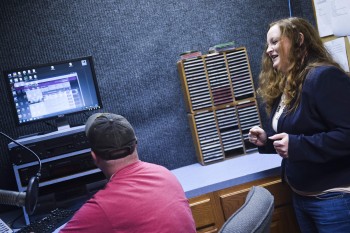
Sabrina Shrader records a campaign ad at Princeton radio station Star FM last Thursday. Shrader is running for the House of Delegates, and has been partially funded by Bernie Sanders, I-Vt.
PRINCETON, W.Va. — When Sabrina Shrader was growing up in McDowell County, she was taught not to talk about poverty. She was discouraged from discussing problems in her life. She definitely wasn’t pushed to run for political office.
But all of that has changed as Shrader has taken up a new role as an advocate and a voice for social change in Southern West Virginia.
In the past three years, Shrader has been asked to testify about her personal experiences with poverty in front of the West Virginia Legislature and a U.S. Senate subcommittee.
She has met with Sen. Bernie Sanders, I-Vt., and taken part in the former Democratic presidential candidate’s campaign stop in Kimball in early May.
Now, the 32-year-old Princeton resident is running in her first political race, as a candidate for the West Virginia House of Delegates’ 27th District, and she is receiving some help.
Shrader is one of the first state and local political candidates in the country who has received campaign finance support from Our Revolution, a fundraising group started by Sanders after the liberal candidate lost the Democratic primary to presidential nominee Hillary Clinton.
Shrader, who is new to nearly every aspect of politics, is listed among 104 other progressive candidates nationwide that Sanders and his allies have chosen to fundraise for in this year’s elections. She’s the only one from West Virginia.
Altogether, Shrader’s campaign has received more than $12,000 from the Our Revolution network, which is comprised of political supporters of Sanders, a candidate who largely campaigned on the issues of income inequality, corporate malfeasance and unlimited campaign spending.
The additional funding has been a huge boost to Shrader’s limited campaign. It’s allowed her to pay for yard signs, some political mailers, several billboards around town and a couple of large campaign magnets for the side of her orange Chevy sedan — advertising that elicits more than few honks as she drives through town.
On the first day of early voting, Shrader was back at the local radio station to record one of her last advertisements before Election Day. It took her one take to deliver the message that she had written out with the help of her family — her public-speaking practice obviously coming in handy.
“I wouldn’t have been able to get any of this,” Shrader said, as she stood in the small studio dressed in blue jeans, a blazer and a string of plastic pearls. “I probably would have just had some fliers.”
But even with the financing help from Our Revolution, Shrader faces an uphill battle in her campaign.
She is pitted against three Republican incumbents in John Shott, Marty Gearheart and Joe Ellington. Her home county is currently represented by Republican gubernatorial nominee and Senate President Bill Cole, and she’s pursuing office in a state that flipped to Republican control for the first time in 80 years in 2014.
All signs point to West Virginia becoming more conservative. But Shrader believes her message on economic populism and income inequality — mirrored after the Sanders campaign — can work in one of the poorest regions in the country.
Being new to politics, Shrader has had to overcome some learning curves. She’s had to figure out how to navigate inter-party politics. She’s tried to make the obligatory rounds at local chamber of commerce meetings and Rotary club gatherings.
Shrader’s been interviewed by numerous foreign journalists that have visited West Virginia this election season, including reporters from Britain, Canada and Austria. But at home, her campaign isn’t getting as much attention as she would like.
Still, she thinks her work making phone calls and shaking hands is paying off, even with West Virginians who are supporting Republican presidential nominee Donald Trump.
If she’s elected, Shrader admits that there’s still more that she’ll have to master. She doesn’t know what legislative committees she would want to serve on, and the policies and procedures of the Legislature are still something of an unknown to her.
But she said she believes she has a grasp on the issues that most affect the people in her district and West Virginia.
She wants to push for an earned income tax credit, which would return more money to working families during tax season. She is upset that every student in the state doesn’t have the textbooks they need for school — something she said she experienced firsthand as a child. And she is appalled that West Virginia has one of the highest rates of youth incarceration in the country.
“Nobody in power has the perspective I do,” Shrader said, reflecting on her childhood, which she only later realized was spent in poverty.
“We’ve been grateful and thankful for not enough for far too long,” she said.
The would-be politician is the first person in her family to graduate from high school and the first to earn a college degree. She sits on the board of directors for Legal Aid of West Virginia, the National Association of Social Workers and the Healthy Kids and Families Coalition.
Of late, Shrader has made her campaign her full-time job. Without an income, she has been supported by her husband, who works in the technology department at the Princeton Community Hospital — one of the county’s largest employers, alongside the Mercer County Board of Education.
If Shrader is elected to the Legislature, she said, she hopes the office will give her a bigger platform to raise issues that she doesn’t feel many state leaders are talking about, like poverty, a lack of educational resources and limited access to food.
“It would give me respect,” she said, “and when people respect you, they listen to you.”
Reach Andrew Brown at [email protected], 304-348-4814 or follow @Andy_Ed_Brown on Twitter.






